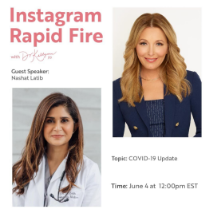Discover How to Support Your Largest Organ on Your Fertility Journey
Your skin is your largest organ, and it plays a vital role in your overall health and wellness and your fertility. Your skin protects what’s inside you by retaining water and nutrients while keeping harmful bacteria and viruses out. In addition, your skin helps you maintain your body temperature and makes vitamin D when exposed to the sun. It’s also full of nerve endings to help you sense the outside world and avoid damage from things that are too hot, cold, or sharp.
We can support our skin from the inside and the outside. Internally, what we eat and drink affects all of our vital organs—including our skin. We will share some of the most important foods for skin health below.
What you put on your skin is also super important too. It absorbs everything, and you need to be mindful of the skincare products you use to avoid toxins with known negative impacts on fertility.
Keep reading to find out how to support your largest organ on your fertility journey.
Foods for Your Skin
Your skin is a complex organ and needs various nutrients daily to stay healthy. Here are some of my top recommendations.
Water
You may not always think about water as an essential nutrient, but it is. Water plays many important roles in your body. It’s the main component in your cells and fluids – including semen for men and cervical mucus for women. It allows you to maintain your body temperature, and it provides shock absorption for your joints. It’s no wonder that adults are 60% water.
When it comes to our skin, water is just as essential. Your skin has three layers. The outermost layer—the one you see and feel—is called the epidermis. The middle layer is the dermis, and underneath that is your hypodermis. When your epidermis doesn’t have enough water, your skin feels rough and loses elasticity. The water your epidermis needs comes from the inside. One clinical study found that when participants who didn’t drink a lot of water increased their intake, their skin became more hydrated, and their skin’s “extensibility” improved within 2 weeks. Drinking more water can help skin hydration and may be particularly beneficial if you have dry skin or don’t drink enough water.
How much water do you need every day? We recommend consuming half of your body weight in ounces of water daily. For example, if you weigh 150lbs, your water intake goal would be 75 ounces.
Note that these fluids can come from drinking water or other beverages and can even come from water-rich foods like soups, fruits, and vegetables.
We help our clients address their nutrient deficiencies, and our formula has over an 80% success rate in those who are ready and commit to our process.
Protein
Protein is an essential macronutrient which means you need quite a bit of it every day (more than with micronutrients like vitamins where you need much smaller amounts every day). Protein comprises parts of your cells, your immune system’s antibodies, and the enzymes needed for thousands of reactions (including digestion) – plus, it’s a key component of healthy fetal development.
Your skin is made up of several different proteins. For example, collagen and elastin are very plentiful and build up the structure of your skin. Over time, and with exposure to the elements, your body’s ability to produce collagen decreases. Keratin is another important protein in your skin. Keratin makes up the outer epidermis layer giving it rigidity and enhancing its barrier protection.
The recommended daily amount of protein is based on your body weight. For every 20 lbs you weigh, you should try to get just over 7 grams of protein daily. This means a person who weighs 140 lbs needs about 50 g protein/day, while someone who weighs 200 lbs would need about 70 g protein/day.
Protein is found in meat, poultry, fish, dairy, and eggs. Plant-based protein sources include soy, lentils, beans, nuts, seeds, whole grains, and even vegetables like corn, broccoli, and asparagus.
Essential fatty acids
Two types of fatty acids are essential nutrients for our health and our skin. They are linoleic acid (omega-6) and linolenic acid (omega-3). Omega-3 fatty acids, in particular, are anti-inflammatory and have been linked to many health benefits, including increasing the chances of getting pregnant.
A higher intake of linoleic acid is associated with lower skin dryness levels and thinning as skin ages. On the other hand, a lack of fatty acids is linked to increased water loss from the skin, drying it out and causing weakness in the protective outer barrier.
You can get these essential fatty acids from eating fish (salmon, tuna), shellfish, nuts (walnuts), seeds (flax, chia, pumpkin, sunflower, sesame), oils (soy, canola), leafy vegetables, and avocados.
Vitamin C
Vitamin C is an essential nutrient and has several functions, including making other nutrients more absorbable and available. It also helps protect the eggs and sperm from damage, and a deficiency can lead to decreased fertility. Vitamin C also contributes to skin health.
Every day you should aim for at least 75 mg of Vitamin C. Fruits and vegetables are rich sources – in particular, bell peppers, citrus fruits (oranges, grapefruits), broccoli, cauliflower, strawberries, kiwis, blackcurrants, potatoes, rose hip, and parsley.
Vitamin E
Vitamin E is a group of essential vitamins called tocopherols. They are fat-soluble antioxidants that work synergistically with Vitamin C. When given together, vitamins C and E (and zinc) can speed up wound healing. A deficiency of Vitamin E is linked to red, dry skin.
Vitamin E is often applied directly (topically) on the skin to reduce redness and some of the effects of sun damage. Ingesting Vitamin E helps the skin from the inside by protecting collagen and fats from breaking down. One clinical study successfully improved dermatitis symptoms (skin inflammation) in participants who took Vitamin E supplements over several months.
The recommended daily allowance for Vitamin E (alpha-tocopherol) is 15 mg. You can get Vitamin E in vegetables, oils (wheat germ oil, olive oil, vegetable oil, sunflower oil), nuts (almonds, hazelnuts), spinach, broccoli, corn, kiwis, and soy.
External Skin Care for Fertility
Skin is the body’s largest organ, and it absorbs everything that we put on it. This means that the products we use on our skin, including skincare, can significantly impact our overall health, including our fertility.
Toxic skincare products that contain harmful chemicals can have a negative impact on fertility. Chemicals to watch out for:
- Phthalates: commonly found in fragrances, lotions, and hair care products, have been linked to decreased sperm motility and increases in abnormal sperm.
- Parabens: commonly found in makeup and personal care products, have been linked to breast cancer tissues and can mimic estrogen in the body leading to hormone imbalances.
- Synthetic fragrances: found in many personal care products, can also be harmful. These fragrances can disrupt hormone levels and negatively impact fertility.
It is important to be mindful of the ingredients in the skincare products we use and choose products free from harmful chemicals. Look for products that are labeled as paraben-free, phthalates-free, and fragrance-free. Natural and organic products are also a good option as they are less likely to contain harmful chemicals.








